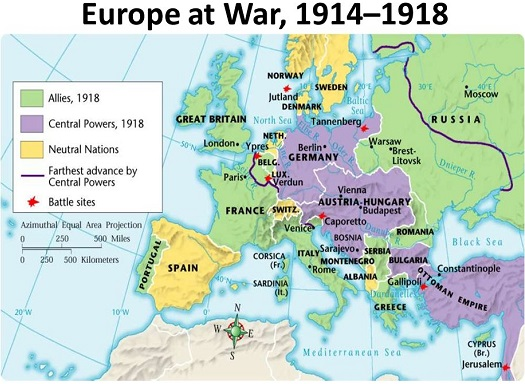Unit 11: World War I in Europe (1914-1918) Overview
Unit 11: World War I in Europe (1914-1918)

Unit 11: World War I in Europe (1914-1918)

Unit 11: World War I in Europe (1914-1918)
World War I began in 1914, after the assassination of Archduke Franz Ferdinand, and lasted until 1918. During the conflict, Germany, Austria-Hungary, Bulgaria and the Ottoman Empire (the Central Powers) fought against Great Britain, France, Russia, Italy, Romania, Japan and the United States (the Allied Powers). Thanks to new military technologies and the horrors of trench warfare, World War I saw unprecedented levels of carnage and destruction. By the time the war was over and the Allied Powers claimed victory, more than 16 million people—soldiers and civilians alike—were dead.
Archduke Franz Ferdinand
Tensions had been brewing throughout Europe—especially in the troubled Balkan region of southeast Europe—for years before World War I actually broke out.
A number of alliances involving European powers, the Ottoman Empire, Russia and other parties had existed for years, but political instability in the Balkans (particularly Bosnia, Serbia and Herzegovina) threatened to destroy these agreements.
The spark that ignited World War I was struck in Sarajevo, Bosnia, where Archduke Franz Ferdinand—heir to the Austro-Hungarian Empire—was shot to death along with his wife Sophie by the Serbian nationalist Gavrilo Princip on June 28, 1914. Princip and other nationalists were struggling to end Austro-Hungarian rule over Bosnia and Herzegovina.
The assassination of Franz Ferdinand set off a rapidly escalating chain of events: Austria-Hungary, like many in countries around the world, blamed the Serbian government for the attack and hoped to use the incident as justification for settling the question of Serbian nationalism once and for all.
World War I Begins
Convinced that Austria-Hungary was readying for war, the Serbian government ordered the Serbian army to mobilize, and appealed to Russia for assistance. On July 28, Austria-Hungary declared war on Serbia, and the tenuous peace between Europe’s great powers quickly collapsed.
Within a week, Russia, Belgium, France, Great Britain and Serbia had lined up against Austria-Hungary and Germany, and World War I had begun.
Unit Focus
- Events in Europe resulting in the growth of imperialism and strong feelings of nationalism
- Impact of military buildup and development of alliances in Europe
- Reasons World War I (the Great War) began in Europe
- Main causes of World War I (MAIN—militarism, alliances, imperialism, nationalism)
Vocabulary
Lesson Reading
Videos and Interactives (Click on Images to View Content)

